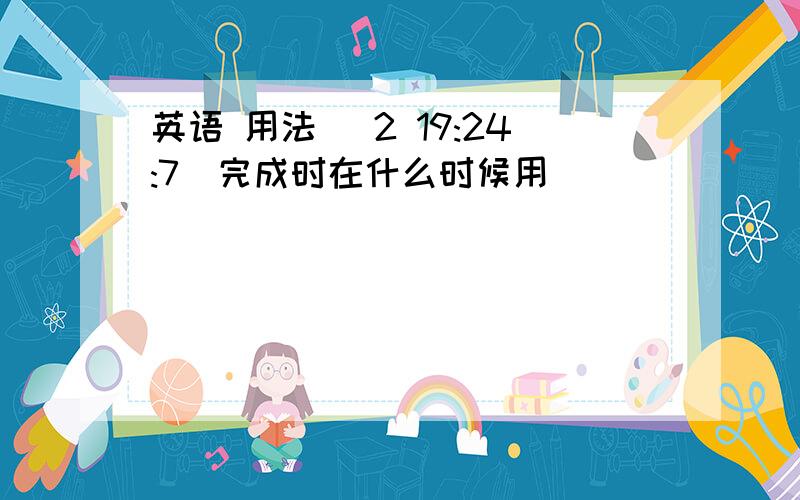英语 用法 (2 19:24:7)完成时在什么时候用
来源:学生作业帮助网 编辑:作业帮 时间:2024/04/25 12:14:46

英语 用法 (2 19:24:7)完成时在什么时候用
英语 用法 (2 19:24:7)
完成时在什么时候用
英语 用法 (2 19:24:7)完成时在什么时候用
以下两种情况使用现在完成时:
1.表一个过去动作对现在的影响也就是影响性,它与过去一般时容易混淆.因为都表过去动作,区别是,一般过去时常有具体的过去性时间点作时间状语,强调在什么点上发生了---动作:
examples
1).I had my lunch at 12:30.
2).He came here half an hour ago.
现在完成时表的过去动作主要强调它多现在的影响,而不是在什么点上发生,因此不跟具体时间点,却常有already(早已)/yet(还没)just,before 等时间比较含糊的时间状语从句,
examples
1).She has already finidhed her competition./I haven't yet.
2).You have just told me about it.
3).We haven't heard of him before.
2.现在完成时还表持续性,这种情况下要用延续性动词表动作从过去的一个点一直持续到现在(可能还仍在持续着)常跟由since引导过去点状时间状语表动作起点,还可跟由for引导的线状时间状语表时间线段)
examples:
1.I have been a nurse since 10 years ago(I have been a nurse for 10 years)
2.We have lived in the town since we moved here two years ago/We have lived in the town for two years since we moved here.
3.He has been a mumber of the Party for 4 years.(这里be a mumber of 不能用非延续动词短语
完成时有现在完成和过去完成时,你说的应该是现在完成时吧。表示过去发生的动作持续到现在,活对现在造成影响。
有技巧的,这个句子一定能看出两个时间,过去与现在,缺一不可。
现在完成时
have∕has + P.P.
⑴ 与just连用,表示刚刚完成的动作或状态(just放在have∕has与P.P.之间)。
I have just had lunch.
He has just finished his homework.
⑵ 表示动作发生在过去,持续到现在,有可能延续到将来,常与since“自从…”(后面跟...
全部展开
现在完成时
have∕has + P.P.
⑴ 与just连用,表示刚刚完成的动作或状态(just放在have∕has与P.P.之间)。
I have just had lunch.
He has just finished his homework.
⑵ 表示动作发生在过去,持续到现在,有可能延续到将来,常与since“自从…”(后面跟一点时间)for(后面跟一段时间)连用。
I have learned English since 2000.
He has lived there for 10 years.
⑶ 表示过去的动作对现在的影响。
He has lost his key.
⑷ 与最高级连用,表示“到目前为止最…”
You’re the cleverest girl that I’ve seen.
⑸ 与It∕This the first time that…连用, 表示“第一次……”
It∕This is the first time that he has learned English.
⑹ have∕has been to…曾经去过…(已经回来了)
have∕has gone to…去了…(还没回来)
I have been to Shanghai.
Tom has gone to Shanghai.
⑴单数第三人称:
肯:S.三 + has + P.P. +…
否:S.三 + has not (hasn’t) + P.P. +…
肯疑:Has + S.三 + P.P. +…?
Yes, S.三 + has.
No, S.三 + hasn’t.
否疑:Hasn’t + S.三 + P.P. +…?
Yes, S.三 + has.
No, S.三 + hasn’t.
⑵其他人称:
肯:S. + have + P.P. …
否:S. + have not ( haven’t ) + P.P. …
肯疑:Have + S. + P.P. …?
Yes, S. + have.
No, S. + haven’t.
否疑:Haven’t + S. + P.P. …?
Yes, S. + have.
No, S. + haven’t.
过去完成时
had + P.P.
⑴ 动作发生在过去的某一时间之前,持续到过去的这一点,有可能延续到将来。
By the end of last year , I had lived here for 20 years .
⑵ 动作在过去的某一时间已经完成。
He had finished his homework before his mother came in .
⑶ 动作常用于间接引语中,表示某事在我们过去所谈话或者所思考的时间以前已经发生了。
Tom said that he had been to about 30 countries .
肯:S. + had + P.P. +…
否:S. + had not (hadn’t )+ P.P. +…
肯疑:Had + S.+P.P. +…?
Yes, S. + had.
No, S. + hadn’t.
否疑:Hadn’t + S. + P.P. +…?
Yes, S. + had.
No, S. + hadn’t.
收起